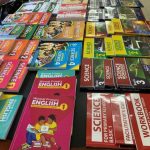Learning is a lifelong journey, whether you’re a young student navigating elementary school, a high schooler preparing for college, or a parent supporting your child’s education. At Schoolnet, we believe that cultivating effective study habits can empower learners of all ages to achieve their academic and personal goals. This post explores five essential study habits that benefit students, parents, and even adult learners returning to education. By adopting these strategies, you can foster a love for learning, improve academic performance, and build skills that last a lifetime.
1. Create a Dedicated Study Environment
A conducive study environment is the foundation of effective learning. Whether you’re a student tackling homework or a parent helping your child with math, a distraction-free space enhances focus and productivity. For younger learners, this might mean a colorful desk with organized supplies, while older students may prefer a quiet corner with minimal distractions.
To set up an ideal study space:
- Choose a quiet location: Avoid high-traffic areas like the living room during family gatherings.
- Organize materials: Keep books, pens, and devices within reach to minimize disruptions.
- Minimize distractions: Turn off notifications on devices and use noise-canceling headphones if needed.
- Personalize the space: Add motivational quotes or a vision board to inspire young learners.
Parents can play a key role by ensuring their child’s study area is tailored to their needs. For adult learners, a consistent study spot—whether at home or a library—signals to the brain that it’s time to focus. Schoolnet recommends experimenting with different setups to find what works best for your learning style.
2. Practice Active Learning Techniques
Active learning involves engaging with material in a hands-on way, rather than passively reading or listening. This habit is crucial for students of all ages, as it promotes deeper understanding and retention. For example, elementary students can use flashcards to learn vocabulary, while high schoolers might summarize complex texts in their own words.
“The best way to learn is to teach. When you explain a concept to someone else, you solidify your own understanding.” — Dr. John Medina, Brain Rules
Active learning strategies include:
- Summarizing and paraphrasing: Rewrite key points in your own words to reinforce comprehension.
- Teaching others: Explain concepts to a peer, sibling, or parent to test your knowledge.
- Using visual aids: Create mind maps or diagrams to visualize relationships between ideas.
- Asking questions: Encourage curiosity by asking “why” and “how” during study sessions.
Parents can support active learning by engaging in discussions with their children about what they’re studying. For instance, ask your middle schooler to explain a science concept over dinner. Adult learners can join study groups or online forums on Schoolnet to share insights and ask questions, fostering a collaborative learning environment.
3. Set Realistic Goals and Track Progress
Goal-setting is a powerful habit that helps learners stay motivated and organized. Whether it’s a kindergartener aiming to read a new book each week or a high school student targeting a specific GPA, clear goals provide direction. Parents can guide younger children in setting achievable milestones, while older students and adults can use tools like planners or apps to track progress.
To set effective goals:
- Be specific: Instead of “I’ll study math,” aim for “I’ll complete 10 algebra problems by 7 PM.”
- Make them measurable: Use metrics like time spent or tasks completed to track progress.
- Set a timeline: Break long-term goals (e.g., preparing for a final exam) into weekly tasks.
- Celebrate small wins: Reward progress with a treat, like a favorite snack or a short break.
Schoolnet’s online resources include printable goal-setting templates and progress trackers, perfect for students and parents alike. By regularly reviewing goals, learners can stay on track and adjust their strategies as needed.
4. Embrace Mistakes as Learning Opportunities
Fear of failure can hinder learning, but embracing mistakes fosters resilience and growth. For young students, mistakes might mean misspelling a word or misunderstanding a math concept. For older learners, it could involve struggling with a complex subject like chemistry. Parents and educators can model a positive attitude toward errors, showing that mistakes are a natural part of learning.
“Mistakes are the portals of discovery.” — James Joyce
Encourage students to:
- Reflect on errors by asking, “What can I learn from this?”
- Seek feedback from teachers or peers to understand where they went wrong.
- Try again with a new approach, whether it’s re-reading a chapter or practicing a different problem set.
Parents can reinforce this habit by praising effort over perfection. For example, commend a child for trying a challenging task, even if the result isn’t perfect. Adult learners can benefit from Schoolnet’s forums, where users share stories of overcoming academic setbacks, inspiring others to persevere.
5. Prioritize Time Management
Time management is a critical skill for students, parents, and lifelong learners. Younger students need structure, such as a homework schedule, while high schoolers juggle academics, extracurriculars, and social lives. Parents often balance supporting their children’s education with work and household responsibilities.
Effective time management tips include:
- Use a planner: Digital or paper planners help track assignments and deadlines.
- Prioritize tasks: Focus on high-impact tasks first, like studying for an upcoming test.
- Break tasks into chunks: Divide large projects into smaller, manageable steps.
- Avoid multitasking: Concentrate on one task at a time for better efficiency.
Schoolnet offers time management workshops and downloadable schedules to help families stay organized. By modeling good time management, parents can teach children the value of planning, while adult learners can apply these skills to balance education with other responsibilities.
Why These Habits Matter
These five habits—creating a study environment, practicing active learning, setting goals, embracing mistakes, and managing time—form the backbone of successful learning. They empower students to take ownership of their education, help parents support their children effectively, and enable adult learners to pursue new knowledge with confidence. At Schoolnet, we’re committed to providing resources, from webinars to printable tools, to help you implement these habits.
By integrating these strategies into daily life, learners of all ages can unlock their potential and make education a rewarding, lifelong pursuit. Visit Schoolnet’s resource hub to explore more tips and tools for academic success.








 Kenya
Kenya 